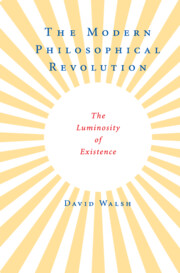Book contents
- Frontmatter
- Contents
- Preface
- Introduction
- 1 Kant's “Copernican Revolution” as Existential
- 2 Hegel's Inauguration of the Language of Existence
- 3 Schelling on the Beyond of Existence
- 4 Nietzsche: Philosophy as Existence
- 5 Heidegger's Achievement Despite the Betrayal of Philosophical Existence
- 6 Existence Without Refuge as the Response of Levinas
- 7 Derrida's Dissemination of Existence as Différance
- 8 Kierkegaard's Prioritization of Existence over Philosophy
- Epilogue: Modernity as Responsibility
- Works Cited
- Select Bibliography of Secondary Sources
- Index
Epilogue: Modernity as Responsibility
Published online by Cambridge University Press: 05 June 2012
- Frontmatter
- Contents
- Preface
- Introduction
- 1 Kant's “Copernican Revolution” as Existential
- 2 Hegel's Inauguration of the Language of Existence
- 3 Schelling on the Beyond of Existence
- 4 Nietzsche: Philosophy as Existence
- 5 Heidegger's Achievement Despite the Betrayal of Philosophical Existence
- 6 Existence Without Refuge as the Response of Levinas
- 7 Derrida's Dissemination of Existence as Différance
- 8 Kierkegaard's Prioritization of Existence over Philosophy
- Epilogue: Modernity as Responsibility
- Works Cited
- Select Bibliography of Secondary Sources
- Index
Summary
A study that has sought to be a meditation on the priority of existence over all reflection cannot have a conclusion. We cannot abandon the central insight of the enterprise merely because we have reached an end of the account. Falling back into conventional patterns would suggest we have reached an answer when all along we have emphasized the singular discovery of modern philosophy as inconclusiveness. Endlessness has been the guarantee of its vitality. Or rather it has been the pursuit of an end that could never be reached that has ensured its proliferation. Misconceptions have ever arisen from the conceit that we might yet be on the verge of grasping the goal of our search. The confusion has been of millennial scope, for it has rested on a fundamental misunderstanding of the very possibility of philosophy, of science, and of civilization. Attainment of the goal is fatal to the process of attainment itself. Now we are in a better position to appreciate why this must be so, for there is no goal external to the movement by which our whole existence is drawn. We cannot possess that which already possesses us so fully that it underpins all possibility of possession by us. But this also means that we can never lose that which we seek. Anxiety about the loss of existence, of the failure of the philosophical quest itself, need no longer deflect us into an illusory grasp at certitude.
- Type
- Chapter
- Information
- The Modern Philosophical RevolutionThe Luminosity of Existence, pp. 461 - 466Publisher: Cambridge University PressPrint publication year: 2008



